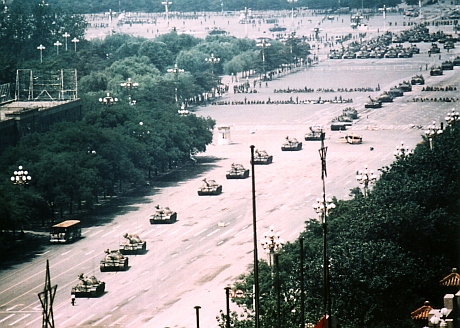Today is the 25th anniversary of the horrible events that took place in Beijing’s Tiananmen Square on June 4, 1989, during which Chinese troops opened fire on unarmed student demonstrators.
In this off-air shortwave radio recording of Radio Beijing, made on June 3rd, 1989, you’ll hear the news reader/editor depart from the script and comment on the massacre of protestors in Tiananmen Square:
It’s believed this brave news editor was detained shortly after the broadcast and spent years in a detention (re-training) camp.
Rest assured, you will hear no mention of the Tiananmen Square protests on China Radio International today–even though this year marks the 25th anniversary of the event. China’s state media goes to great lengths to keep this sort of on-air protest from happening again. State media even tries to limit on-line research of the protests; last year, we posted a fascinating article which listed banned search engine terms in China.
I also encourage you to check out Jonathan Marks’ comments (from a broadcaster’s perspective) on this particular Radio Beijing broadcast.


Rather than dying fo cancer prior to 2014, YuanNeng was still alive and working in LA as of 2014. https://www.881903.com/Page/ZH-TW/News_Featuredetail.aspx?itemid=717916&csid=901_3580
Keith Perron runs PCJ Media/PCJ Radio and has been spreading misinformation about this for years. Yuan Neng was found alive in 2016 due to the efforts of a Canadian filmmaker who read my blog posting where I discuss how I recorded the audio back on that evening 1989 working at a radio station when the massacre took place. As you can see my his comment under his PCJ Media handle, Keith denies Yuan Neng is the announcer, but now says that he is. Whatever his agenda, Keith really doesn’t know anything much about the incident. http://www.aeolus13umbra.com/2012/05/lost-voice-of-radio-beijing.html
The voice is certainly not Li Dan. While Li Dan was the head of the English Service at the time, like many of heads of languages at Radio Beijing right after June 4th many were sent to what is known in China to Communist School. To re-learn the ideology. We need to remember that leading up to what happened in Tiananmen Square 3 of the 4 major media outlets in China CCTV (Central China Television) and Central People’s Broadcasting Station (today known as China National Radio), and Radio Beijing had been in support of the students. Xinhua continued to follow the party line. This is part due, because they are directly controlled by the central committee. Those who were on duty in the newsroom were Yuan Neng, Wu Xiaoyong, Xu Huazhen, Cui Hong and Hu Zhang. Wu Xiaoyong what the news editor on shift and was also the deputy director of the English Language Service. He wrote the story than announcer Yuan Neng agreed to read on air. It was not recorded. It was live. Starting in late 1986 newscasts in English on Radio Beijing were live. After he read the short item he informed the engineer to run the tape that was in all Radio Beijing studios at the time incase of technical programs. Nothing happened to these two right away. It was not until CNN and BBC World Service ran the clip that they were both arrested. Yuan Neng was sentenced to 10 years in prison. Upon his release he was banned from ever working in the Chinese media. He passed away a few years ago from cancer. Wu Xiaoyong was placed under house arrest in part because his father was a high ranking government official with the Ministry of Education. He was banned from working in any Chinese media outlet. He eventually moves to Hong Kong and became one of the key people involved in Phoenix Television. Li Dan eventually returned to Radio Beijing from Communist School. Not to long after his return he was promoted to one of the VP positions in Radio Beijing, then later he would become the president of China Radio International and is now one of the key people at CCTV. Xu Huazhen was promoted as one of the department heads in the English Service not to long after, because she reported on staff in Radio Beijing who had been showing support to the students. She eventually because the deputy director and party sectary of the English Service. Cui Hong nothing happened, because at the time she was only a script writer. She still works in the English Service of China Radio International. But she is not permitted to travel or leave China. Hu Zhang remained at Radio Beijing for another 2 year before leaving for Singapore and then he moved to Taiwan in 1998. He has a management position at the TV channel where I work. We get together every now and again.
Dear Keith Perron: I came across your comment when I was researching for this broadcasting. I feel so sad when I know that Yuan Neng didn’t end up well. I feel especially sad for this part of your comment: “Nothing happened to these two right away. It was not until CNN and BBC World Service ran the clip that they were both arrested. ” It reminded me of Milan Kundera’s The Bearable Lightness of Being, in which Tereza, the photographer, who does dangerous and politically dissident work as a photojournalist during the Soviet tank occupation and only to find out later that her work becomes evidence for persecution – the authority peruse Tereza’s work published on American magazines and newspapers, and arrest dissidents accordingly. Well, the reason I’m writing to you is to ask for your permission to quote your comment in my book. My book is a memior. I wasn’t involved in Tiananmen Incident personally at that time. I was working at a Japanese company, witnessing the incident only while I was passing Tiananmen Square to and from work during the martial law when public transportation was down. But Tiananmen Incident left a deep mark in my mind and I couldn’t explain clearly my later decisions in my life without narrating it.